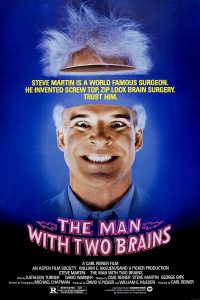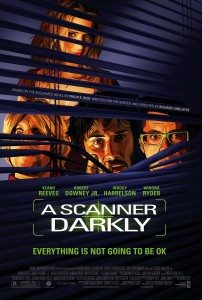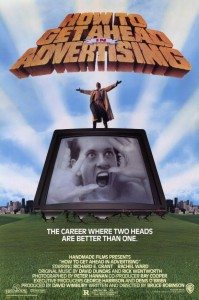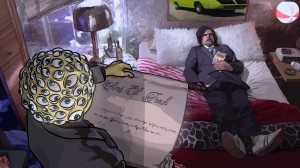 I’m of two minds about this week’s Mind Control Double Feature.
I’m of two minds about this week’s Mind Control Double Feature.
Part of me thinks that I’m the one who watched it, but the other part of me doesn’t recognize the part of me that thinks it watched it as me.
Confused? That’s just like you!
No, not you, the other you. The you that’s surreptitiously usurping control over your life while the other you wallows deeper into your mental mire. The you that’s giving the other you a little helpful push on the back. A push in deeper.
Soon you’ll be so submerged in you that you won’t even know who you are any more. Assuming you had some idea of who you were to begin with?
Go ahead and struggle if it makes you feel better. You’re bound to win. And to lose. And to watch two movies as part of this week’s Mind Control Double Feature, in which two heads are — debatably, marginally — better than none.
A Scanner Darkly (2006)
 Bob Arctor has a problem. That problem is Substance D, the highly addictive narcotic that disconnects the hemispheres of one’s brain. Exacerbating this trifling issue is the fact that Bob is also an undercover narc. As such, he — disguised — reports on everyone in his crew of pathetic drug fiends, including himself.
Bob Arctor has a problem. That problem is Substance D, the highly addictive narcotic that disconnects the hemispheres of one’s brain. Exacerbating this trifling issue is the fact that Bob is also an undercover narc. As such, he — disguised — reports on everyone in his crew of pathetic drug fiends, including himself.
If he could just keep straight which one of these losers was him.
Richard Linklater‘s A Scanner Darkly faithfully adapts the identically named novel by science-fiction master Philip K. Dick. It was shot digitally and then rotoscoped — that being the odd style of animation drawn over photography to produce an effect not unlike rolling wild down the abrasive slopes of the uncanny valley.
The film, underneath its various layers of identity, tracks Bob’s descent into addiction. It is this character’s accompanying loss of self — something that Dick understood — which motivates and deteriorates him. As his brain battles itself for self-recognition, Bob Arctor manages to both win and lose, but mostly lose.
As the poster suggests: Everything is not going to be okay.
Bob (Keanu Reeves) starts skipping like an old sun-scarred LP. He has become addicted to Substance D, the drug that he set out to combat, and it’s his own fault. He bought as much of it as possible from Donna (Winona Ryder) attempting to uncover the narcotic’s high-level source, which — he isn’t sure — may be himself.
As ‘Fred’ — his police informer codename — Bob always reports wearing a ‘scramble suit’ — an outfit that constantly warps his appearance so that he resembles a constantly changing mixed puzzle of other people. He rats to his superior, ‘Hank,’ who also wears a scramble suit. Bob/Fred watches surveillance footage of his ramshackle home, which is shared with Barris (Robert Downey Jr.) and Luckman (Woody Harrelson), and frequented by Freck (Rory Cochrane). He observes the guys, including himself, taking drugs and talking an endless parade of insanity.
And Bob tries to remember who he is as he buys drugs and reports on himself and makes progress on the inevitable bust. Maybe soon he’ll catch himself red-handed!
If all that sounds perverse and dark and difficult; yes. A Scanner Darkly is not the happiest film you will watch, although it is quite funny in a miserable, dystopic way. Maybe don’t watch it with your grandma?
It is also seriously loony-making, but it’s probably too late for you anyway.
The disorienting story darts about with minimal signposting. This is one of its challenging charms. Linklater assumes that you possess the intelligence and cognitive ability to keep up. I hope you prove him correct.
In terms of its appearance, A Scanner Darkly looks as wild as it feels. The interpolated rotoscoping (which Linklater first applied in his odd philosophical feature Waking Life) finds its ideal subject matter in this mad tale. As the film’s characters descend deeper down the bifurcated rabbit hole of Substance D, their hallucinations overtake the animation. No one looks like who they are for long, even when they’re not high or wearing a scramble suit. It’s like when you look at your face in the mirror too long and it ceases to be your face.
The soundtrack full of Radiohead songs doesn’t hurt, either.
Underneath all of these identity issues, Arctor — if that’s who he is — has something to accomplish. Something important. If only he knew what it was and which him was him, he might have a chance.
Maybe knowing would make the task harder, though? It’s easier to sell poison to a total sucker, even if that sucker is you.
How to Get Ahead in Advertising (1989)
 Sometimes, it doesn’t matter if who you’re selling to is a total sucker or not. Sometimes, you can sell anything to anybody. That’s how it is for David Dimbleby Bagley — except when he’s trying to sell boil cream.
Sometimes, it doesn’t matter if who you’re selling to is a total sucker or not. Sometimes, you can sell anything to anybody. That’s how it is for David Dimbleby Bagley — except when he’s trying to sell boil cream.
Which is what’s going on in Bruce Robinson’s How to Get Ahead in Advertising. All told, this is what is generally referred to as an unhinged film. Unhinged in an insane, bizarre, giant boil filled way.
It is almost entirely — from start to finish — an opportunity for underrated actor Richard E. Grant to go completely mental. He starts the film on a tear and ends it, after a lot of ranting and screaming and face-pulling, on a much larger tear, screaming unholy madness into the great wide sucker-filled void. Or at least one of him does. One of him do?
I am not prepared for complicated grammar of this sort.
For in How to Get Ahead in Advertising, Grant plays a high-strung advertising executive who is losing his mind, has lost his mind, and is gaining an extra mind all at once.
With his advertising deadline looming hard, Bagley cannot come up with any good ideas or any bad ideas. He has no ideas vis-a-vis boil cream. None. The pressure gets to him. He screams at his colleagues, burdens his wife (Rachel Ward), insults his guests, and harangues random people on the train (including Python Terry Jones).
Still: no idea on how to sell boil cream. What comes instead is the grand-pappy of all boils, sprouting on his neck like, well, a carbuncle with a mustache. Which is what it is.
As Bagley’s stress balloons, so does his boil until, quite remarkably and literally, it takes over his life.
Now, I could go on and tell you all about the evil boil and its plans to sell us all toothpaste, but I think it would be better if you just watched How to Get Ahead in Advertising for yourself. Some things words cannot truly capture and Richard E. Grant going batshit crazy is one of them.
This may not be a particularly cinematic film, but its charms are plentiful. Beyond Grant’s manic acting, the script offers up a generous share of delicious monologues, if talking to your own blemish is a monologue? Director Bruce Robinson — who previously worked with Grant on Withnail & I, one of those cult films that does wonders for the sinuses — provides the voice for the boil, at least sometimes. The rest of the time it’s just Grant and there is no length to which Grant(s) will not go.
It is not overacting, it is true abandon. As in abandon all hope ye who enter here.
You will buy our boil cream and if you don’t, it’s because we don’t want you to. And yes, that’s the Royal We, as I’m talking about me and the other me and the me with dastardly intent and the me who has taken rather a lot of Substance D this morning.
At least I think that’s me. I may be a bit confused. Let me just check with the guy who’s typing this up; he looks the sort of fellow who might be able to work it all out.






I LOVED how to get ahead in advertising, watched that videotape till it was unplayable in high school. Richard E Grant is brilliant and way unappreciated. (Though it’s been nice to see him get a fun and meaty turn on Girls this last year.) Hudson Hawk was actually supposed to be his vehicle for mainstream stardom; sadly it was not to be. Though his performance in it is a treat.
I haven’t seen Hudson Hawk in decades. Not sure I have the stomach for another viewing… Advertising holds up, though.
Says the guy who watched every Fast and Furious movie…
When Hudson Hawk came out I felt it didn’t really deserve the mountains of abuse it got. I’m actually curious to check it out again, though I suspect I’ll find Bruce Willis far more insufferable than I did at the time.
Excuse me, I’ve only watched 4 out of 6.5 F&F films (so far).
Watch Hudson Hawk and write about it for us. The gauntlet has been thrown.
You realize I have children right? I’ll see if I can. (I actually have a post for you guys half-written about why mega-franchises should be anchored in TV rather than movies, but I haven’t had time to finish it.)
I can tell you why I think I initially reacted warmly to it: When it came out, it was billed as a standard Bruce Willis action vehicle, and universally panned. So that’s what I was expecting. I saw it on a summer weekday with David when we had nothing to do and nothing else was playing. And it was FAR more bizarre and ambitious than anything I was expecting. And it had Richard E Grant as a billionaire maniac supervillain (whom we’d been watching all summer on our deteriorating “How to Get Ahead…” videotape and who was virtually unknown in Hollywood), so immediately got props for that.
Frankly, I’d love to see more big budget summer movies attempt to be this weird, even if they ultimately fail. It would produce much more interesting failures than the ones we’ve got.
I have minor hopes that Guardians of the Galaxy will attempt something in this vein of weirdness. Very minor hopes.
I confess to being quite addicted to A Scanner Darkly, more to Philip K. Dick’s novel than to kind of animation film, but both have that unique, priceless reflection of paranoia which was perhaps Dick’s most outstanding feat besides his sheer endless imagination. One might even say that his imagination was fuelled by his paranoia and viceversa,
A Scanner Darkly, the schizophrenic tale of drug addiction thus becomes even eerier when being paired with paranoid fears of persecution, which as generally in Dick’s literature, were somehow justified, for there was always something/someone out to get you. Dick lived that paranoia in body and mind and that’s why his short stories and novels are so utterly compelling. A good portion of that intensity has flown into the making of A Scanner Darkly, the film. I like the idea of relying on this kind of real action made into animation film with those real actors’ voices as well. It adds an additional layer of strangeness which I believe becomes the cinematic retelling of Dick’s story. They might have done it with heavy CGI, but I think the road they went is just perfect. Keanu Reeves appeared suitable for the job and Woody Harrelson is just perfect in his role. Remarkable I found the solution they found for the scramble suit. When I first read the novel I had all kinds of visuals in my head for that thing and I believe they did the idea justice.
Yes. It’s one of my favorite books and the film gets it just right. That said, it’s a difficult story to absorb. Worth it, but difficult.
The movie version didn’t really do it for me. The book is one of PKD’s best.
Definitely! My favorite PKD, in my opinion the best thing he ever wrote. The most “Philip K Dick” of all the Philip K Dick novels. (Though Ubik is about as weird as they come.)
You may be right that it’s his best book. The Man In The High Castle is up there with it, though. As to it being the most “Philip K Dick” of his books, I wouldn’t say that. So many of his books are completely insane, with so many similar themes and tropes turning up. It’s just that it all comes together story-wise and emotionally so well in Scanner.
After having read a handful of his better known books in my college days, I’ve in the last few years been slowly reading everything else he ever wrote. I think I’ve read close to 30 of his novels at this point.
And in reference to an old conversation on some other distant post, I just read Lem’s The Futurological Congress, and wow, that is one of the most nutsy cuckoo books ever written. One hell of a translation job, too.
Yeah, Lem’s translator is I think the same one for most of his major works, definitely the same guy as Cyberiad. (Michael Kandel? I get a cookie if I’m right, not googling, I swear.) It’s a ridiculous job–so much of his satire is about language.
Man in the High Castle is wonderful and probably his most polished novel. I’ve always been a big fan of Flow My Tears too. Scanner Darkly to me encompasses all of the themes and tropes Dick obsesses about (pre-satellite beaming information into his brain), but wraps it within a very personal story reflecting what it was like to watch so many people he loved destroy themselves. It’s got this melancholy throughout that’s kind of beautiful.
It’s been a while since I dove back into his stuff, I should probably go back. I actually had an internship with his editor for the Valis books a million years ago. In an alternate life I’m an editor at Tor Books living like a pauper in Manhattan but loving my day job.
I believe you’ve earned your cookie, though I’m not looking up his name either. That’s definitely the guy. He translated most of Lem’s stuff, or the big ones, anyway.
Flow My Tears I re-read recently amidst all the lesser PKD I’ve been getting to, and while it’s a very good one, it’s kind of oddly digressive.
Some you should read if you haven’t already are Time Out of Joint, Dr. Bloodmoney, Now Wait For Last Year, and The Three Stigmata of Palmer Eldritch.
I’ve read the last two (Now Wait for Last Year just a couple years ago actually). Just downloaded Time Out of Joint to the kindle. BTW, if you’re looking for something short and weird to read, Annihilation by Jeff VanDerMeer was that. First of a triology, so it doesn’t exactly end. It’s kind of a cross between Lost and House of Leaves. (If that horrifies you, probably avoid it.)
How utterly wonderful to stumble into this fine circle of DIck-minded people …
I too enjoyed Ubik and Man in the High Castle had me re-reading it twice. Lately I have been discovering Dick’s early short stories and I confess some are just bonkers and others are bonkers and jewels. There was this one written somewhen in the mid fifties, called The Defenders. It really is a little piece of genius and it could not be more actual with all those A.I. concerns. It’s amazing to see how one man’s mind could anticipate our worries more than half a century ago.
As for Lem, I think there are very few authors dead or alive who had his philosophers’ mind and depth, his capacity to walk the human psyche like it was a map. His work inspired many of my SF art.
I think a little revisiting of Tarkovsky’s Solaris might be on the menu soon (unless you guys have it already covered as almost always).
Nope, don’t think we’re written up Solaris yet. I’d watch that one again, though I don’t recall loving it. Tarkovsky sometimes draws things out to create a feeling of the epic where the epic part is missing. Or so I recall thinking about Solaris. It’s certainly different than the book, which it had to be. I recall the book being jam packed with scientific descriptions of the ocean/lifeform.
I watched Solaris recently. Big ideas but obtuse in that Tarkovsky way. Not moved to write about it.
Exactly, I concur with your thoughts about the Tarkovsky version of Solaris. But I also believe that the Hollywood remake did not make the book the slightest justice. Why do you think there are two films made on the base of the same book and both fail to capture its very essence or its appeal? I would love to hear your thoughts about this.
I am perhaps a philistine, but I found Solaris to be really, really boring. (The book, as well as the movie(s)). I can understand why people admire it and think it’s important. Guess it’s not my thing. For the darker side of Lem, I preferred His Masters Voice, which is about as bleak as it gets (both for the characters and the limitations of humanity as Lem describes them), but still a really good read.
Oh I can fully relate to your sentiment and I don’t think it has anything to do with being philistine. I have always loved the philosophical implications of Science Fiction and thought those were the ultimate reason to be for SF, but I would lie if I said I do not enjoy all the meat and bones around those core thoughts, that make a good SF book, story or film. We are just differently knit and while too elaborate pseudo-scientific or technical descriptions tend to bore me after a while, for other people it’s the underlying concepts or thoughts that might get too heavy for real pleasure. I guess it’s all about a good balance?
Definitely. The Futurological Congress is philsophical (in an extremely biting, satirical way), but is also a wild, fun ride. Karel Capek’s War with the Newts along the same lines. (And I think it’s available for free if you have an e-reader and haven’t read it.) I concede my own philstine tendencies in the sense that I don’t have a lot of patience for really slow books, even if they’re otherwise worth while. There’s only so much I can take of a small group of people cooped up on a spaceship being depressed and confused. (Though I thought the theme was handled masterfully by Ren and Stimpy: https://www.youtube.com/watch?v=MHBUyAIF418 )
War With The Newts. That’s a good one. Why isn’t that a movie?
Having not read the book, I can’t really answer. But some books just don’t translate well to the screen. The ideas are ones that visualization does not help communicate. The process of reading is slower; it lets you digest and assimilate vast concepts in a way that watching a movie doesn’t.
Perhaps Solaris is one of those books that must be read. Although I’ve been meaning to re-watch Soderbergh’s version.